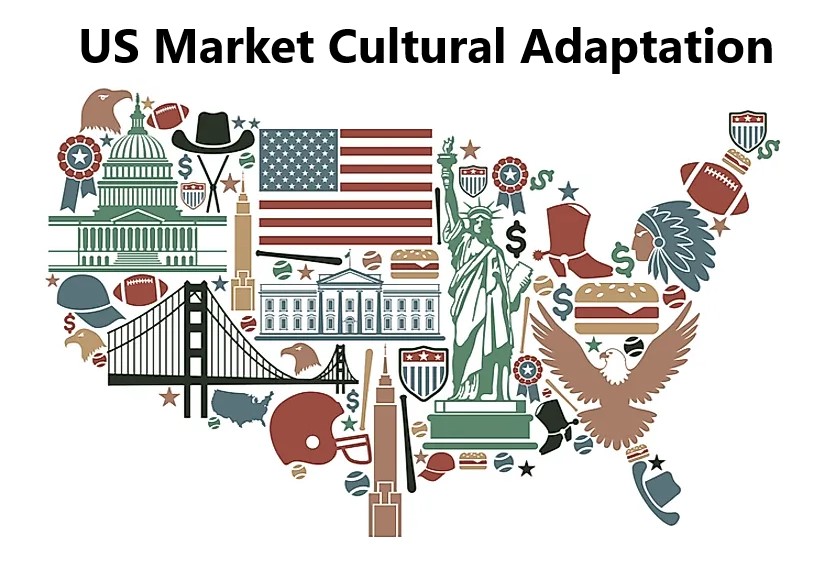
US Market Cultural Adaptation is crucial for any business entering and thriving in the diverse, competitive American market. It involves aligning business practices with the cultural norms, values, and preferences of US consumers. This alignment is essential for building strong customer relationships, enhancing brand reputation, and ensuring long-term success in the United States.
The Importance of US Market Cultural Adaptation
US Market Cultural Adaptation is crucial for many reasons. The United States is a melting pot of cultures, with various ethnicities, languages, and traditions. This diversity offers both opportunities and challenges for businesses entering the market. By adapting to the cultural nuances of different consumer groups, businesses can tailor products, services, and marketing strategies for a broader audience.
Additionally, cultural adaptation helps businesses avoid miscommunication and misunderstandings due to cultural differences. Marketing campaigns successful in one country may not translate well in the US because of differing humor, values, or norms. Investing in cultural adaptation allows businesses to create more effective marketing strategies that directly address US consumer needs and desires.
Another key aspect of US Market Cultural Adaptation is its impact on customer experience. American consumers value personalized experiences and expect businesses to cater to their specific preferences. Companies that successfully adapt to the US market are more likely to build loyal customer bases and generate positive word-of-mouth, both of which are crucial for sustained growth.
Key Strategies for Effective US Market Cultural Adaptation
To succeed in the US market, businesses must use effective cultural adaptation strategies. The first step is conducting thorough market research. Understanding the cultural dynamics of different US regions is crucial because preferences can vary significantly by state or city. For example, a marketing strategy that works in New York may not be as effective in Texas due to cultural differences.
Another important strategy is localizing your brand’s messaging and communication. This includes adapting marketing materials, advertisements, and product names to align with American cultural norms. Using American English spelling and grammar ensures effective communication with US consumers. Additionally, businesses should be mindful of cultural sensitivities, avoiding imagery or language that could be seen as offensive or inappropriate.
Building a local presence is also a key component of US Market Cultural Adaptation. Establishing a local office or hiring local staff can provide valuable insights into the US market’s cultural nuances. Local employees understand the cultural context and help bridge the gap between your business and American consumers. Partnering with local businesses or influencers further enhances your brand’s credibility and visibility in the US market.
The Role of Digital Platforms
In today’s digital age, online platforms play a significant role in US Market Cultural Adaptation. Social media, in particular, offers businesses a unique opportunity to engage directly with US consumers and understand their preferences in real-time. By monitoring social media trends and interactions, businesses can gain insights into consumer behavior and adapt their strategies accordingly.
Moreover, digital marketing campaigns can be tailored to target specific cultural groups within the US. Platforms like Facebook, Instagram, and Google Ads allow businesses to create highly targeted advertisements based on demographics, interests, and geographic location. This level of customization is essential for reaching diverse consumer segments and ensuring that your marketing efforts resonate with the intended audience.
Additionally, e-commerce platforms must be adapted to meet the expectations of US consumers. This includes providing customer service in English, offering multiple payment options, and ensuring that the website is optimized for both desktop and mobile users. A seamless and culturally relevant online shopping experience is crucial for converting visitors into loyal customers.
Challenges in US Market Cultural Adaptation
Despite its importance, US Market Cultural Adaptation comes with its own set of challenges. One of the primary challenges is the sheer size and diversity of the US market. With over 330 million people and various cultural groups, it can be difficult for businesses to effectively cater to every segment of the population. As a result, businesses must prioritize their efforts and focus on the regions and demographics that align most closely with their brand.
Another challenge is balancing global brand identity with local cultural adaptation. While it is important to adapt to the US market, businesses must also ensure that their brand’s core values and messaging remain consistent across all markets. This requires a careful and strategic approach to cultural adaptation that respects both the local culture and the global brand identity.
Finally, cultural adaptation requires ongoing effort and investment. The US market is constantly evolving, with cultural trends and consumer preferences changing over time. Businesses must stay informed about these changes and be prepared to adjust their strategies as needed to remain relevant and competitive.
Conclusion
US Market Cultural Adaptation is not optional; it’s essential for businesses aiming to succeed in the American market. Understanding and aligning with US cultural preferences allows businesses to build strong relationships and enhance brand loyalty. This adaptation drives long-term growth. Although challenging, the rewards of successful cultural adaptation are well worth the effort.

